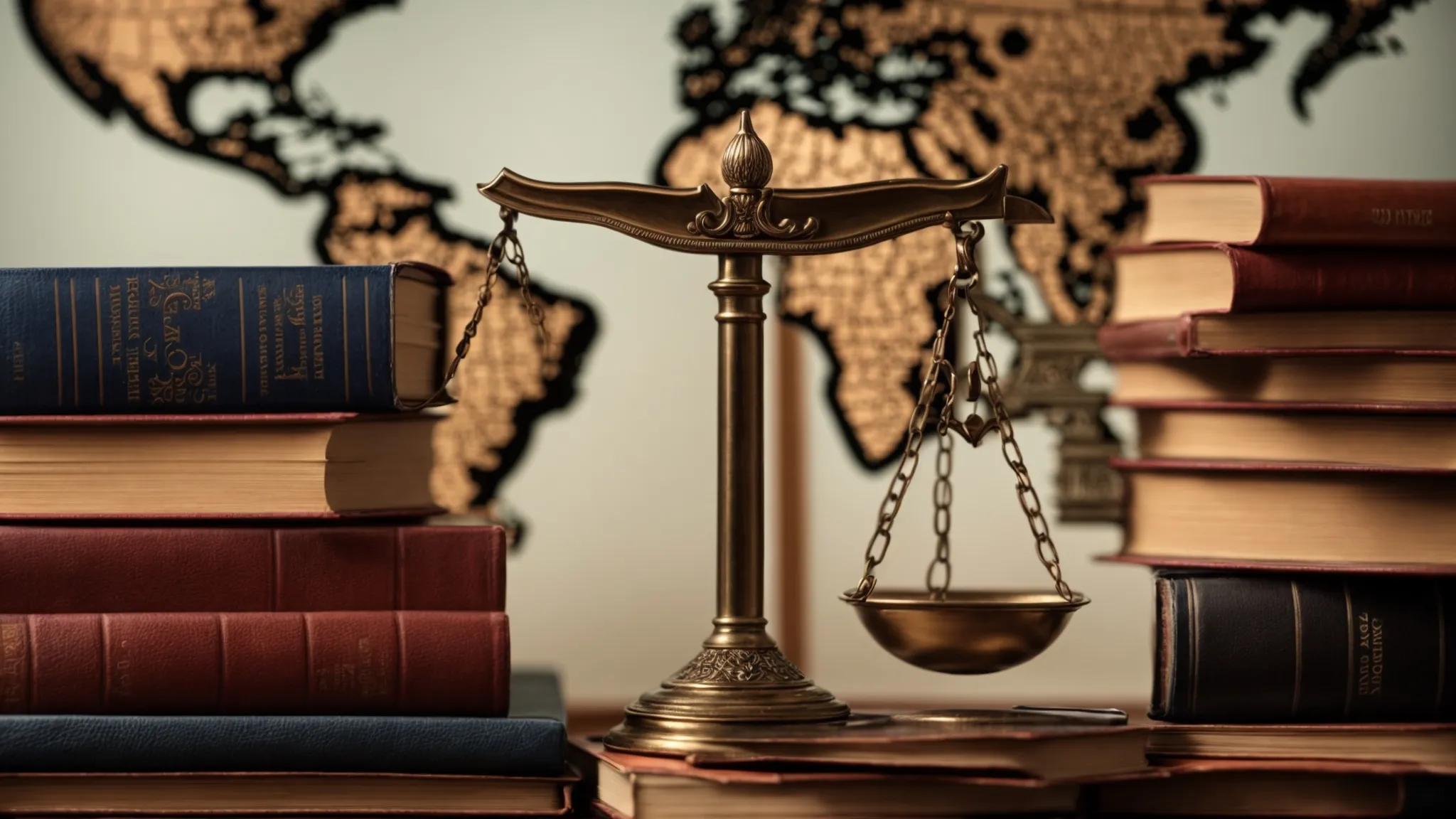International Debt Collection: Cross-Border Legal Guide
In the complex realm of commerce, debt recovery takes on a pronounced and intricate form when it spans across international borders.
Organizations and creditors navigating this terrain must acquaint themselves with the nuanced procedures of international debt collection, where law intertwines with cultural understandings and jurisdictional hurdles. International Centre for Settlement of Investment Disputes, Middle East, Court of Appeal, Latin America, United Nations, intellectual property, forum selection clause, joint venture, United Nations Commission on International Trade Law, European Union, and construction are all important considerations.
Whether dealing with a defaulted payment processor invoice or a delinquent joint venture agreement, the recovery process demands expertise in legal systems, arbitration mechanisms, and the prevailing norms of international trade law.
Insightful preparation and strategic execution form the pillars of successful debt recovery, especially where diverse governance and policy frameworks underpin each case.
Keep reading to discover a structured approach to international debt collection infused with proven tactics and legal insights.
Key Takeaways
- International Debt Collection Encompasses Legal Complexities and Cultural Sensibilities Across Borders
- Arbitration and Mediation Serve as Crucial Alternative Dispute Resolution Methods in International Debt Recovery
- The New York Convention and the UNCITRAL Model Law Play Pivotal Roles in the Enforcement of Arbitration Awards Globally
- Engaging Local Legal Expertise Is Essential for Navigating the Nuanced Legal Systems Involved in Cross-Border Debt Collection
- Effective Communication and Negotiation Strategies Are Fundamental to Amicable Settlements in International Debt Recovery
Understanding the Basics of International Debt Collection

In a globalized market where commercial boundaries seemingly dissolve, entities engaging in international trade frequently confront the issue of overdue payments, compelling them to delve into the realm of international debt collection with the help of a global collection agency.
This intricate process, which straddles multiple legal frameworks and diverse cultural norms, necessitates a clear understanding of the necessary steps to implement effective debt recovery strategies while maintaining scrupulous adherence to the varying laws of jurisdiction and the convention on the recognition and enforcement of foreign arbitral awards.
As companies explore the key components of the debt collection process and unravel the complexities of debt collection laws worldwide, they safeguard their financial interests and uphold the delicate balance between assertive enforcement and diplomatic negotiation.
Defining International Debt Collection
International debt collection refers to the process of pursuing outstanding debts from debtors located in different countries, a challenge that is magnified due to the intricacies of varied legal systems, cultural practices, and language barriers. This pursuit involves understanding legal statutes across borders, leveraging international treaties such as the convention on the recognition and enforcement of foreign arbitral awards, and sometimes engaging with foreign legal counsel to ensure a systematic and lawful approach to debt recovery.
Such collections demand meticulous planning and sensitivity to the nuances of international commerce, necessitating tools like incoterms and adherence to conventions such as the United Nations Convention on the International Sale of Goods. Entities must navigate through the provisions of the international legal landscape to assert claims while honoring the jurisdictional complexities inherent in cross-border transactions. International trade is a complex field that requires careful consideration of various factors including incoterms, investment, and policy.
| Aspect of Collection | Consideration |
|---|---|
| Cultural Sensitivity | Adapting tactics to align with debtor’s cultural practices and communication styles. |
| Legal Adherence | Complying with domestic and international laws, including jurisdiction-specific regulations and treaties like the United Nations Commission on International Trade Law (UNCITRAL). |
| Diplomatic Negotiation | Employing tactful negotiation strategies that reflect an understanding of the debtor’s economic position and preserve future business relations. |
| International Treaties | Utilizing frameworks such as the New York Convention on the recognition and enforcement of foreign arbitral awards to resolve disputes. |
Key Components of the Debt Collection Process
The tenor of success in international debt collection hinges upon the precise execution of pivotal components, chief among them being the identification and understanding of the debtor’s circumstances. Enterprises striving for efficient debt recovery benefit immensely from an in-depth analysis of the debtor’s financial health, relevant contractual obligations, and any governing laws that might influence proceedings, ensuring their approach is tailored and informed.
Another fundamental element resides in the selection of an appropriate dispute resolution method. Whether opting for negotiation, mediation, arbitration, or proceeding straight to litigation, entities must meticulously weigh the nuances and potential outcomes of each approach. The choice is often swayed by considerations such as the efficacy of alternative dispute resolution mechanisms, the impact of legal actions on international relations, and the prospects of enforcement under varying international arbitration frameworks.
Understanding Debt Collection Laws Across Different Countries
The matrix of international debt recovery is strewn with a complex patchwork of national legislations and practices. Navigating this labyrinth requires an intimate grasp of sovereign laws that dictate the legal proceedings surrounding debt collection, ranging from pre-litigation debt collection methods to the execution of judgments. The resolution of disputes may involve alternative dispute resolution mechanisms such as the arbitration tribunal or the International Centre for Settlement of Investment Disputes (ICSID).
It is paramount for a creditor to recognize that each country’s regime presents its own set of challenges and procedures: some may favor the creditor, while others might be more protective of the debtor. Furthermore, entities must discern whether bilateral or multilateral treaties influence debt collection, such as the reciprocal enforcement of judgments or arbitration awards within certain jurisdictions:
| Country | Creditor Stance | Instrument Influencing Enforcement |
|---|---|---|
| United States | Favorable | New York Convention |
| Brazil | Debtor-Protective | MERCOSUR Agreements |
| India | Moderate | Bilateral Treaties |
| Germany | Favorable | European Union Regulations |
Comprehension of such parameters is not merely academic; it informs strategy, guiding corporations when structuring their contracts with clauses like the choice of law and forum selection or even in deciding to include an arbitration clause. This keen awareness is the bulwark against unforeseen hurdles in the international debt collection arena.
Preparing for International Debt Recovery

Embarking on the journey of international debt recovery commences with a comprehensive assessment of the prevailing debt situation.
It is incumbent upon creditors to conduct a detailed probe to illuminate the debtor’s asset profile and concomitant jurisdictions, thereby illuminating a path through the sometimes murky waters of international arbitration and transnational finance.
Engaging in direct communication with the debtor is a cornerstone of this multifaceted process, setting the stage for a clear, structured dialogue aimed at a collaborative resolution.
This preparatory phase lays the groundwork for the strategic execution of debt collection, buttressing the creditor’s positioning with vital intel and fostering an environment ripe for successful recoveries.
Assessing the Debt Situation
Initiating the debt recovery process necessitates a thorough evaluation of the amount outstanding, including scrutinizing contractual terms and examining invoices left unpaid. It behooves a creditor to establish the totality of the debt in question, ensuring a clear understanding of the financial parameters and the grounds on which they may pursue collection efforts.
During this critical assessment, the creditor must also consider the broader economic conditions impacting the debtor’s ability to fulfill their obligations. Such diligence affords insight into the debtor’s liquidity and potential for timely restitution, ultimately shaping the creditor’s strategy and enhancing the prospects of recovering the owed sums.
Identifying Debtor’s Assets and Jurisdiction
Successful debt recovery efforts hinge on pinpointing the precise location and nature of the debtor’s assets. A creditor’s ability to enforce a debt collection outcome often depends on accurate knowledge of the debtor’s asset distribution across jurisdictions, which may include real estate, bank accounts, investments, or intellectual property holdings requiring judicious examination. A lawyer with experience in overseas debt collection can provide valuable assistance in this process.
Proficiency in discerning the relevant jurisdiction is essential as it determines the applicable legal framework and enforcement mechanisms at the creditor’s disposal. Creditors are encouraged to engage with legal professionals from international law firms or specialized debt collection services, such as the global collection agency, to navigate the complexities of transnational asset identification and recovery within various legal territories.
Establishing Communication With the Debtor
Once creditors have a sound understanding of the debtor’s financial landscape, establishing open lines of communication becomes imperative. Through dialogue, parties can explore the nuances of the outstanding debt, aiming to reach a consensus on repayment without escalating to more adversarial dispute resolution methods. Alternative dispute resolution is a preferred option in such cases.
This initial outreach signals a willingness to engage in constructive negotiation and serves to inform the debtor of the creditor’s intentions to recover the owed amounts. Effective communication often entails clarity, transparency, and the invitation to discuss potential payment plans or settlements with due consideration to the debtor’s fiscal constraints. Alternative dispute resolution is also a viable option to resolve the issue.
| Communication Stage | Description | Objective |
|---|---|---|
| Initial Contact | The creditor establishes the first point of communication with the debtor to discuss the outstanding debt. | To introduce the matter at hand and signal the intention to resolve the debt issue amicably. |
| Negotiation | Structured discussions centered around potential repayment plans or settlements. | To come to an agreement that respects both parties’ interests and facilitates the repayment process. |
Legal Framework for International Debt Recovery

In the global pursuit of debt recovery, companies, and legal professionals must tread a path charted by diverse legal systems and international frameworks.
Each nation’s approach to debt collection is unique, posing distinct legal challenges that can be mitigated with the strategic application of international treaties and conventions.
Easy recourse to funds is rarely available; hence, to traverse this complex terrain effectively, creditors must enlist the expertise of local legal scholars and practitioners.
Their profound knowledge and experience become indispensable when interpreting each jurisdiction’s nuances, ensuring compliance with regional laws, and fortifying the creditor’s position in negotiations and potential legal proceedings.
Exploring Different Countries’ Legal Systems
Firms embarking on debt recovery operations across borders must confront the disparate legal environments that shape the debt collection landscape. A creditor’s proficiency in distinguishing between the legal systems of civil law jurisdictions, with their comprehensive statutes and codes, and common law territories, where precedent wields significant influence, can considerably impact the trajectory of recovery efforts.
Engagement with local jurisdictional expertise is integral, facilitating an accurate interpretation of procedural variances and enforcement practices that govern both creditor rights and debtor protections within different countries. This understanding enables organizations to astutely maneuver through the complexities of international law astutely, ensuring that their approach to debt recovery adheres to the distinct legal requirements of each nation involved. International arbitration is particularly crucial in this regard.
The Role of International Treaties and Conventions
In the tapestry of international debt recovery, treaties and conventions act as pivotal threads, connecting disparate legal systems and providing a cohesive framework for creditors. The New York Convention and UNCITRAL Model Law on International Commercial Arbitration, for example, offer a blueprint for recognizing and enforcing arbitration awards, which is critical when national court judgments may not be as readily enforceable across borders. The arbitration clause is crucial in ensuring the smooth resolution of disputes in international trade.
These international accords establish a mutual understanding and facilitate cooperation among states, streamlining dispute resolution processes. A creditor relying on such instruments may find their position fortified, with smoother enforcement of debt collection endeavors in foreign territories, provided the debtor nation is a signatory and upholds the treaty provisions, as stipulated by the arbitration clause:
| Treaty/Convention | Purpose | Significance to Creditors |
|---|---|---|
| New York Convention | Enforcement of Arbitral Awards | Enables uniform enforcement across member states |
| UNCITRAL Model Law | Arbitration proceedings standardization | Assures creditors of a consistent arbitration process |
Engaging Local Legal Experts
Securing the services of local legal experts is a strategic decision that organizations must consider when pursuing international debt collection. Such specialists bring not only a wealth of knowledge pertaining to their specific legal system but also a nuanced grasp of local customs and business practices that can be pivotal to the success of debt recovery efforts.
Whether it’s navigating the complexities of the Middle East’s regulatory landscape or understanding the subtleties of Latin America’s jurisdictional nuances, these seasoned practitioners ensure that every step taken aligns with regional governance norms and procedures. Their expertise often proves crucial in effectively managing the legal intricacies and potential obstacles encountered throughout the international debt recovery process. Additionally, their knowledge of international trade and investment plays a significant role.
Strategies for Effective Debt Collection Abroad

In the intricate dance of international commerce, the melody sometimes falters when debts remain unpaid, prompting creditors to seek resolution across the globe.
Spearheading effective debt collection abroad necessitates an expansive toolkit, encompassing strategies such as amicable settlement techniques and astute judgments regarding the escalation to legal action.
Crucially, leveraging international dispute resolution mechanisms, including arbitration and mediation overseen by esteemed institutions such as the International Chamber of Commerce, the International Center for Dispute Resolution, the Permanent Court of Arbitration, the London Court of International Arbitration, and other notable tribunals, provides a structured pathway to settling cross-border financial disputes.
Each approach carries with it the potential for nuanced negotiations and outcomes, underscoring the imperative for creditors to wield these instruments with discernment and precision.
Utilizing Amicable Settlement Techniques
In orchestrating international debt collection, the strategic deployment of amicable settlement techniques often precedes more formal avenues of dispute resolution. By initiating settlement discussions, creditors can establish a constructive environment conducive to negotiation, harnessing methods such as mediation to foster a mutually acceptable resolution while preserving the underlying business relationship. Alternative dispute resolution plays a vital role in this process.
Employing such non-adversarial strategies allows parties to circumvent the rigidity and costs associated with court-driven recovery processes. Creditors, empowered by these techniques, are better positioned to secure debt repayment through flexible arrangements that respect the financial realities of the debtor, thereby enhancing the likelihood of amicable and expedient settlements using alternative dispute resolution.
When to Escalate to Legal Action
Escalation to legal action in the pursuit of international debt collection is a significant step that creditors may consider when all amicable settlement avenues have been exhausted. It represents a shift from negotiation to assertion, where creditors enforce their rights through juridical channels to recover outstanding debts.
This legal escalation, a recourse to the structured litigation or arbitration process, is triggered when the debtor remains unresponsive to engagement efforts or when proposed settlements are not honored. An arbitration clause may be invoked:
| Trigger for Legal Action | Rationale |
|---|---|
| Non-Responsive Debtor | Creditors seek judicial intervention when the debtor fails to communicate or acknowledge the debt. |
| Unhonored Settlements | Legal proceedings are initiated when the debtor defaults on agreed-upon repayment arrangements. |
It is imperative for creditors to appraise the potential repercussions of legal action, including cost considerations, the likelihood of successful enforcement, and the impact on future trade relations with the debtor or within the debtor’s region. Hiring a lawyer to handle the lawsuit can provide guidance on alternative dispute resolution methods, such as arbitration or mediation, which may be beneficial in resolving the dispute and preserving international trade relations.
Leveraging International Arbitration and Mediation
Amidst the intricate dynamics of international debt recovery, arbitration, and mediation emerge as vital pillars for resolving disputes outside the courtroom. These alternative dispute resolution (ADR) methods, facilitated by venerable institutions such as the International Court of Arbitration and the American Arbitration Association, offer a neutral platform where creditors and debtors can resolve their conflicts with the guidance of experienced arbitrators and mediators.
Arbitration, in particular, empowers parties with a binding decision issued by a specialized arbitral tribunal, ensuring enforcement under the auspices of the Convention on the Recognition and Enforcement of Foreign Arbitral Awards, commonly known as the New York Convention. Meanwhile, mediation provides a more collaborative approach, enabling creditors and debtors to craft a bespoke settlement through facilitated negotiations, often preserving commercial relationships and reducing contention.
International Chamber of Commerce
The International Chamber of Commerce (ICC) plays an integral role in facilitating debt recovery across borders by promoting uniform rules and practices for international trade. As the world’s largest business organization, it has established the ICC International Court of Arbitration, which provides an authoritative and impartial forum for resolving disputes that arise from global commerce, including debt collection issues.
Through its arbitration and ADR services, the ICC enhances the credibility and enforceability of debt collection efforts, ensuring that the resolutions reached are recognized and respected internationally. Moreover, by providing a clear framework for dispute resolution, the ICC helps to reduce the risks associated with cross-border financial transactions.
International Center for Dispute Resolution
The International Center for Dispute Resolution (ICDR) is the international division of the American Arbitration Association (AAA), offering services for resolving cross-border disputes, including challenges related to debt collection. Its globally recognized framework supports the efficiency and fairness of arbitration and mediation proceedings, thus serving as a cornerstone for creditors seeking equitable debt recovery outcomes.
Catering to the evolving demands of international commerce, the ICDR aids organizations by providing a streamlined arbitration process underpinned by a panel of arbitrators experienced in complex international cases. This expertise is instrumental for creditors who wish to confidently navigate the dispute resolution pathway, minimizing the strain of jurisdictional variances and enhancing the potential for favorable debt recovery solutions.
Permanent Court of Arbitration
The Permanent Court of Arbitration (PCA) stands as an esteemed entity in the field of dispute resolution, offering services that are especially relevant in cases involving state entities, state enterprises, or intergovernmental organizations. Its prominence in managing complex jurisdictional issues and broad acceptability among nations makes it a compelling choice for parties in international trade seeking impartial arbitration for debt collection disputes. The presence of an arbitral tribunal arbitration clause is essential for international trade agreements.
Renowned for its experience in public international law disputes, the PCA facilitates arbitration proceedings that provide enforceable outcomes across multi-jurisdictional arenas. It ensures that creditors and debtors have access to a transparent legal process guided by seasoned experts capable of resolving sophisticated commercial conflicts with efficiency and legal acumen.
| International Dispute Resolution Body | Expertise | Significance to Debt Collection |
|---|---|---|
| Permanent Court of Arbitration | State-related and intergovernmental disputes | Trusted for arbitration involving sovereign and commercial parties |
London Court of International Arbitration
The London Court of International Arbitration (LCIA) is renowned for administering a vast number of international cases, ensuring that debt collection disputes are resolved with a high degree of expertise and neutrality. Its strong adherence to procedural efficiency and enforcement under international law makes it a reputable option for creditors seeking authoritative dispute resolution.
With a legacy dating back to the late 19th century, the LCIA provides a sophisticated setting where disputants benefit from its procedural rigor and the deep commercial acumen of its arbitrators. This court’s resolutions are recognized globally, bolstering the confidence of those engaged in the often challenging international debt recovery process.
Other Tribunals to consider…
In the quest for efficient international debt collection, attention must also be directed towards regional tribunals such as the Hong Kong International Arbitration Centre and the Singapore International Arbitration Centre. These institutions offer specialized local knowledge and a harmonized approach to arbitration that resonates with the commercial practices specific to Asia-Pacific markets. Arbitral tribunals play a vital role in resolving disputes.
Moreover, entities like the Dubai International Arbitration Centre provide bespoke dispute resolution services that cater to the unique commercial environment of the Middle East, often proving essential for creditors navigating debt collection in a region characterized by rapid economic expansion and complex legal landscapes.
Overcoming Challenges in Cross-Border Debt Collection

In the dynamic sphere of international commerce, debt collection across national frontiers presents a tapestry of nuanced obstacles, each demanding strategic finesse, and deep cross-cultural perceptiveness.
Creditors engaging in the realms of global recovery must adeptly handle the intricacies of linguistic diversity and cultural distinctiveness that can impede straightforward communication and mutual understanding. A lawyer with experience in international arbitration, including the implementation of the UNCITRAL Model Law on International Commercial Arbitration, can assist in resolving disputes efficiently.
Identifying and mitigating risks stemming from fluctuating currency values and intricate exchange rate mechanisms further compounds the challenge.
At the nexus of these practical hurdles lies the complex and multifaceted international legal terrain—a landscape where varying legal systems, procedural norms, and enforcement protocols must be carefully traversed to ensure a cohesive and effective debt collection strategy.
This process necessitates a comprehensive approach, bracing creditors to overcome the inherent challenges associated with reclaiming financial dues on the global stage.
Dealing With Language and Cultural Barriers
When creditors pursue debts across borders, they inevitably face linguistic diversities that can obscure the clarity of legal and financial negotiations. Engaging bilingual experts or utilizing professional translation services helps ensure that legal documents, contracts, and correspondences are accurately contextualized and understood.
Cultural barriers, meanwhile, extend beyond mere language differences; each nation has its own business etiquettes and negotiation protocols. It becomes imperative for creditors to be culturally literate to foster trust, respect local customs, and facilitate smoother debt recovery processes:
| Challenge | Strategic Response | Outcome |
|---|---|---|
| Language differences | Use of professional translators | Enhanced understanding and clear communication |
| Cultural distinctions | Cultural literacy and respect in negotiations | Stronger relationships and improved negotiation efficacy |
Addressing Currency and Exchange Rate Issues
In the labyrinth of cross-border transactions, fluctuations in currency and the unpredictability of exchange rates can pose significant risks to the efficacy of international debt collection efforts. Creditors must, therefore, engage in proactive fiscal planning, often hedging against potential losses using trade credit insurance or availing services of financial experts to navigate currency-related challenges and lock in favorable exchange rates.
Moreover, astute creditors incorporate robust clauses within their credit agreements to address currency devaluation and exchange rate variations, ensuring that repayments reflect true value despite international currencies’ volatile ebb and flow. This foresight protects the creditor’s bottom line and serves as a shield against the financial turbulence that international trade can engender.
Navigating the International Legal Landscape
Navigating the international legal landscape requires a precise alignment with regional protocols and sensitivity to the disparate nuances of diverse jurisdictions. Creditors must engage in a judicious blend of legal acumen and cultural dexterity to tackle the legal implications inherent in cross-border debt recovery.
Mastering this domain calls for an intricate blend of legal experience and tactical negotiation skills, with reliance on expert counsel to move adeptly within the framework of international law, ensuring compliance and optimizing the outcomes of debt collection efforts abroad.
Finalizing the Debt Collection Process

As businesses reach the culmination of the international debt collection process, the focus shifts to the practicalities of ensuring that payment is secured and any settlements are finalized.
This critical stage involves the meticulous orchestration of transferring funds across the often intricate tapestry of global financial systems, accompanied by a thorough post-collection review to confirm that all aspects of the case are conclusively addressed and closed.
It’s a phase that demands precision and an understanding of international financial regulations to effectively bring the debt recovery operation to a successful and satisfactory close.
Securing Payment and Final Settlement
Securing payment is paramount in the final act of international debt collection, and creditors must pursue this with precision. The transfer of funds from debtor to creditor signifies the tangible success of recovery efforts and necessitates stringent adherence to agreed terms, including the timing, currency, and payment method. An arbitration clause is crucial in resolving disputes.
- Creditors confirm receipt of payment, accounting for any applicable currency conversions and transaction fees.
- Legal documentation formalizing the settlement must be executed, affirming the discharge of debt and any associated obligations.
- Payment processors or financial institutions play an integral role in facilitating cross-border financial transactions with due diligence.
Upon receipt and confirmation of the payment, the final step is to assertively document the settlement, marking the resolution of the debt. This critical documentation serves as indisputable evidence of the concluded agreement and prevents potential future disputes over the resolved financial obligation.
Handling Transfer of Funds Across Borders
The exigency of remitting payments in international debt collection traverses the complex network of global banking systems, each with its own set of regulatory compliance issues. Corporations engaged in this delicate transfer are compelled to meticulously maneuver through international banking regulations, anti-money laundering protocols, and the intricacies of intermediary banking to secure the seamless repatriation of funds.
Maintaining vigilance over the secure transfer of funds across international boundaries is essential, ensuring that transfers are conducted through legitimate channels under the scrutiny of financial governance bodies. The process demands a rigorous verification of both the sender’s and receiver’s credentials, safeguarding against unauthorized transactions and potential fiscal improprieties in the transference of creditor settlements.
Post-Collection Follow-Up and Case Closure
Ensuring due diligence extends beyond the mere collection of outstanding payments; rigorous post-collection follow-up is imperative when settling international debts. The creditor must meticulously reconcile accounts receivable ledgers, affirming that all payments are accurately recorded and promptly nullifying any remaining collection actions to reflect the finalized status of the debt.
Case closure in the landscape of international debt recovery symbolizes the resolution of financial contention but also mandates an acute emphasis on documentation. Legal professionals often secure and archive relevant case records, formalizing the completion of the collection process, which serves as a reference for any potential queries or future transactions with the debtor.
What to do when you have an arbitration clause

Shifting gears from the overall international debt recovery framework, it’s crucial to dissect the scenario wherein an arbitration clause lies embedded within a commercial contract.
This clause stands as a sentinel, guiding the resolution path when disputes emerge from international commerce and debt collection.
As such, initiating international arbitration involves a well-defined procedural roadmap, starting from the effective commencement of the proceedings to the meticulous crafting of an arbitral award.
Crucial to this journey is not just the tribunal’s decree but also its subsequent recognition and enforcement under the robust New York Convention.
Navigating through these stages requires precision, ensuring that international arbitration fulfills its role as a powerful instrument in the creditor’s toolkit for resolving cross-border financial disputes.
How to start an international arbitration
Initiating international arbitration commences when a party files a notice of arbitration against the debtor, as stipulated by the arbitration clause within their contract. This formal step is a clear indication that the creditor is invoking the arbitral process to resolve the dispute, thereby activating the mechanisms agreed upon by both parties within the contractual framework.
To effectively set the arbitration in motion, the creditor must prepare and submit a comprehensive statement of claim, which delineates the nature of the dispute, the amount involved, and the relief sought. This submission, directed to the designated arbitral institution or according to the rules specified in the arbitration clause, serves as the foundational document upon which the arbitration proceedings will be built.
The procedure
Upon filing a notice of arbitration, the procedural journey unfolds as the creditor and debtor appoint their chosen arbitrators, either independently or through the guidance of the overseeing arbitration institution. The establishment of the arbitral tribunal is a critical step, laying the groundwork for an equitable adjudicative forum that assures a fair hearing for both parties.
The tribunal then sets forth a procedural timetable, a chronology that governs the subsequent phases of the arbitration process, from the exchange of pleadings to the presentation of evidence. This schedule strives to maintain procedural discipline, ensuring that the arbitration advances efficiently towards a resolution in a manner that respects the temporal interests of both creditor and debtor.
The Arbitral Award
The culmination of arbitration proceedings is the arbitral award: a binding decision delivered by the arbitral tribunal after meticulous consideration of the case’s merits. This award determines the debtor’s obligation to compensate the creditor and stands as a definitive resolution of the dispute based on the evidence presented and the applicable law.
Recognition and enforcement of this award are fortified by the New York Convention, which commands international respect and compliance, facilitating creditors to execute the award in the debtor’s jurisdiction. The tribunal ensures the award is conceived with the utmost attention to detail and legality, guaranteeing its robustness against challenges during enforcement proceedings.
| Stage | Description | Outcome |
|---|---|---|
| Delivery of Award | The arbitral tribunal issues a binding decision based on the case’s merits. | Determines the debtor’s financial responsibility to the creditor. |
| Enforcement | Under the New York Convention, the award is recognized globally for enforcement. | Facilitates creditors to collect the awarded amount in the debtor’s country. |
How to enforce the arbitral award under the New York Convention?
Enforcement of an arbitral award under the New York Convention necessitates the victorious party to apply to a competent authority in a jurisdiction where the debtor has assets. The presenting creditor must furnish the original arbitration agreement alongside the authenticated award, imparting official legitimacy to the claim as they seek the authority’s intervention for enforcement.
Once this petition is accepted, the domestic court assesses the award in alignment with the New York Convention’s principles, scrutinizing its conformance to procedural and substantive criteria. Successful validation results in a domestic judgment mirroring the award, enabling the creditor to pursue standard enforcement activities within that jurisdiction, tapping into the debtor’s assets to satisfy the debt.
Essential Key Takeaways for Effective Use of Gravity Forms
Navigating international debt collection is a critical process for entities involved in global trade, requiring diligence, cultural awareness, and legal precision. By understanding and implementing a clear process guide, creditors can effectively manage the complexities of collecting debts across national borders. Such an approach ensures adherence to the diversity of international laws and customs while maximizing the potential for successful debt recovery.
Acknowledging the importance of strategic negotiation, the engagement of local legal experts, and the use of international treaties and conventions like the New York Convention helps to overcome barriers and enforce claims. Ultimately, a systematic and comprehensive process guide is essential for creditors to secure payment and finalize the international debt collection process effectively, safeguarding their financial interests and maintaining favorable business relations in the global market.
Our law firm is here to assist globally, representing you in your international disputes. Our team has extensive experience in international law and international arbitration. We are to help you succeed in your matter. Contact our Office! And let us be your Cross-Border Solution!


